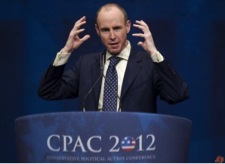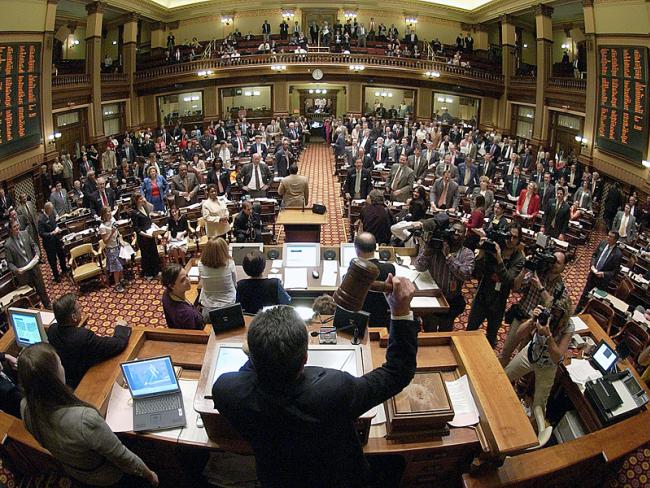By: Ryan Prior 
“Culture is a product of institutions,” the British writer and parliamentarian Daniel Hannan declared to an enthusiastic CPAC crowd. “The success of this country, the energy, the optimism, the self-belief, all go back to that little secular miracle that happened in that old courthouse in Philadelphia nearly two and a half centuries ago.”
The clarity of thought, the outsider’s perspective, and the well-mannered eloquence of his oration were a breath of fresh air at a conference whose ebullient and uncompromising brand of strict conservatism has bewildered the wider political class and even, more specifically, the Republican establishment.
His speech achieved what most of the CPAC speeches failed to do, even Senator Rubio’s quite good keynote on Thursday morning. Hannan’s ability to distill conservative principles to their intellectual core and to articulate them with good- humored optimism was unrivaled at this weekend’s conference. If CPAC attendees are to truly translate their views into a proper governing coalition (rather than, say, a recalcitrant bloc of angry and directionless obstructionists) they would do well to follow Hannan’s example: eschew their air of victimization and exclusiveness, and instead follow his brighter, purer light.
Hannan, who was shortlisted for 2011’s Orwell Prize which is awarded to those who “make political writing into an art,” gained worldwide acclaim for his 2009 tongue-lashing of Prime Minister Gordon Brown as the “devalued Prime Minister of a devalued government.”
“The wonderful thing about coming to this side of the Atlantic,” Hannan opened his speech, “is the optimism, the energy, the drive, and you know, it’s infectious. It carries away even the visitor. He breathes in the air and he starts to be affected by it, too. When I write about or talk about the politics of Europe I’m as cynical as the next world-weary Brit, but when I come here, I get carried away by the mood.”
The theme of his speech was a more apt expression of a familiar notion: that the United States, under President Obama, but just as much under many other leaders, is on a road to Europeanization, of more intrusive government power and less individual liberty. It is far more believable to hear this message from an actual member of the European Parliament than it is from Sarah Palin, CPAC’s closing speaker and the leader, if camera flashes and decibels are a measure, which attendees were most eager to hear.
The bedrock of Hannan’s argument was that institutions, like those specifically established by the U.S. Constitution, are the foundation of an American culture of optimism and ingenuity. It follows, therefore, that the expansion of federal power that constitutes what he sees as a betrayal of the constitutional spirit, can lead to the opposing culture of dependency that conservatives abhor.
Certainly these complex arguments of political philosophy have been explicated and debated in lengthier tomes elsewhere, but worth looking into a couple points. For instance, he read aloud Jefferson’s words from the Declaration of Independence, explaining how it felt as though they were describing Britain’s subjugation by the European Union. The analogy had, of course, an implied extension to Obama-era America. One such statement:
“[the King] has erected a multitude of new offices and sent hither swarms of officers to harass our people and eat out their substance.”
Quoting the Declaration of Independence underscored what he called the “Jeffersonian ideal” of making decisions closer and closer to the people, and he feels the “EU was founded with the opposite imperative. Line one of article one of the Treaty of Rome commits us to ‘ever closer union.’” Where the American constitution promoted states’ rights and localism, the EU, in his view, establishes an overly powerful government in Brussels.
It’s worth noting that the Treaty of Lisbon, which reformed the Treaty of Rome in 2009, revises that clause to concur with his Jeffersonian ideal:
“This Treaty marks a new stage in the process of creating an ever closer union
among the peoples of Europe, in which decisions are taken as openly as possible and as closely as possible to the citizen” (emphasis mine).
Perhaps those lines reflect the growing strength of a renewed European conservatism growing ever attractive amidst their debt crisis, a conservatism Hannan likens to slamming on the brakes in a car:
“We are screeching toward the cliff, and a couple of us…are trying to jam the brakes on while there’s still time. And we look up into the rearview mirror, and what do we see? We see you! Trying to overtake us!”
He was at his strongest when he linked classical antiquity to the American founding and, consequently, to the modern conservative movement, with the adage, “the greatest gift in politics is to renounce power.” George Washington, who could have become a king of America, was at his greatest when he returned to his farm after eight years in power, just as the Roman general Cincinnatus had returned to his own farm following his emergency powers to save Rome. He saw the modest ranch Reagan returned to in California as the modern continuance of that ancient tradition now alive in American institutions and the American character: “the perfect attribute” to “realize that you are passing through institutions that are larger than you are.”

